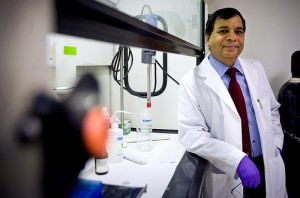QUESTION:
What is malaria? How can it be controlled?
ANSWER:
Malaria is a disease caused by a single-celled parasite called Plasmodium. There are four species that regularly infect humans: P. falciparum (which causes the most severe form of the disease, and is responsible for 90% of the annual 700,000 fatalities caused by malaria, mainly in Africa), P. vivax, P. ovale and P. malariae. A fifth species, P. knowlesi, has recently also been reported in a small number of cases in south-east Asia, where prevalence appears to be increasing.
Despite it’s wide geographic range and potentially severe consequences, there are actually several effective strategies for controlling malaria, many of which have been successful of reducing the burden of the disease, and especially the number of deaths, in various regions. The first step towards control is prevention. This has largely been achieved through the distribution of long-lasting insecticide treated bednets, which prevent people from being bitten by infected mosquitoes as they sleep at night. While this has drastically reduced the number of cases of malaria in some settings, and particularly in certain high risk groups such as children under five and pregnant women, some worrying new data just was published which suggested that in high transmission zones, bednets may actually exacernate re-infection rates for older children and adults, and lead to insecticide resistance in mosquitoes. As such, while bednets clearly are still a key prevention strategy, their effect should be closely monitored.
Secondly, there is diagnosis and treatment. These go hand in hand, as they usually require the availability of health services or health professionals. If malaria infections are rapidly and accurately diagnosed, appropriate treatment can be swiftly given, preventing the progression of the disease and allowing the patient to recover. Appropriate administration of medication, as well as adherence to the full course of the drugs, can also help to prevent drug-resistance from emerging.
Finally, there are on-going research initiatives looking to find new ways to tackle malaria. For example, many scientists are involved in the search for a malaria vaccine, which, if safe, effective, and sufficiently cheap, could transform the way we think about fighting malaria. Similarly, due to the unfortunate circumstance of ever-increasing drug-resistance, particularly in Plasmodium falciparum, new types of medication are constantly being tested and trialled. The combination of all these efforts has managed to reduce the mortality of malaria greatly over the past few years; the aim now, espoused by organisations such as Malaria No More, is to get to a point where deaths from malaria are eliminated by the year 2015.
